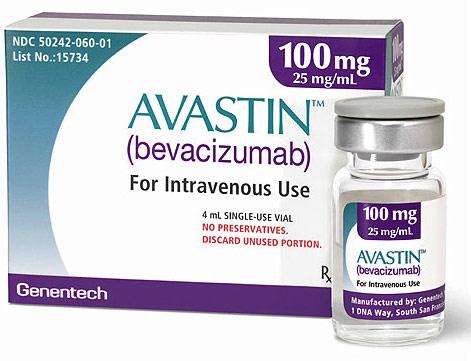Bevacizumab Interactions
There are 54 drugs known to interact with bevacizumab, along with 7 disease interactions. Of the total drug interactions, 16 are major, and 38 are moderate.
- View all 54 medications that may interact with bevacizumab
- View bevacizumab disease interactions (7)
Most frequently checked interactions
View interaction reports for bevacizumab and the medicines listed below.
- Acetylsalicylic Acid (aspirin)
- Aspirin Low Strength (aspirin)
- Augmentin (amoxicillin / clavulanate)
- Bactrim (sulfamethoxazole / trimethoprim)
- Claritin (loratadine)
- Compazine (prochlorperazine)
- CoQ10 (ubiquinone)
- Decadron (dexamethasone)
- Keppra (levetiracetam)
- L-Arginine (arginine)
- L-Carnitine (levocarnitine)
- L-Cysteine (cysteine)
- Lithium Carbonate ER (lithium)
- Metoprolol Succinate ER (metoprolol)
- MiraLAX (polyethylene glycol 3350)
- Paracetamol (acetaminophen)
- PreserVision AREDS 2 (multivitamin with minerals)
- Probiotic Formula (bifidobacterium infantis / lactobacillus acidophilus)
- Quercetin (bioflavonoids)
- Taxol (paclitaxel)
- Tylenol (acetaminophen)
- Valproate Sodium (valproic acid)
- Vitamin B1 (thiamine)
- Vitamin B12 (cyanocobalamin)
- Vitamin B6 (pyridoxine)
- Vitamin C (ascorbic acid)
- Vitamin D3 (cholecalciferol)
- Vitamin K (phytonadione)
- Vitamin K2 (menaquinone)
- Zofran (ondansetron)
Bevacizumab disease interactions
There are 7 disease interactions with bevacizumab which include:
More about bevacizumab
- bevacizumab consumer information
- Compare alternatives
- Reviews (37)
- Side effects
- Dosage information
- During pregnancy
- Drug class: VEGF/VEGFR inhibitors
- Breastfeeding
- En español
Related treatment guides
Drug Interaction Classification
| Highly clinically significant. Avoid combinations; the risk of the interaction outweighs the benefit. | |
| Moderately clinically significant. Usually avoid combinations; use it only under special circumstances. | |
| Minimally clinically significant. Minimize risk; assess risk and consider an alternative drug, take steps to circumvent the interaction risk and/or institute a monitoring plan. | |
| No interaction information available. |
See also:
Further information
Always consult your healthcare provider to ensure the information displayed on this page applies to your personal circumstances.


